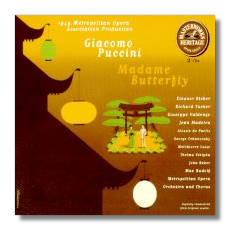
The Internet's Premier Classical Music Source
Related Links
- Puccini Reviews
- Latest Reviews
- More Reviews
-
By Composer
-
Collections
DVD & Blu-ray
Books
Concert Reviews
Articles/Interviews
Software
Audio
Search Amazon
Recommended Links
Site News
 CD Review
CD Review
Giacomo Puccini

Madama Butterfly
- Eleanor Steber (Butterfly)
- Richard Tucker (Pinkerton)
- Giuseppe Valdengo (Sharpless)
- Jean Madeira (Suzuki)
- Alessio de Paolis (Goro)
- George Cehanovsky (Yamadori)
- Melchiorre Luise (The Bonze)
- Thelma Votipka (Kate)
Metropolitan Opera Orchestra & Chorus/Max Rudolf
Sony Masterworks Heritage MH2K 62765 ADD monaural) 2CDs: 59:10, 69:16
More successful than the 1947 Met Bohème that was reissued last year (MH2K 62762), this Madama Butterfly is both a vivid portrait of the house's "routine" and an effective, moving representation of Puccini's ever-loved opera. Having said that, perhaps it is self-contradictory of me to report that - astonishingly - Eleanor Steber never sang Butterfly at the Met, and Rudolf conducted it only once. Nevertheless, they are stars of this recording.
I have to say, right from the top, that Steber is one of my favorite singers, at home in Berlioz's Les nuits d'été (MHK 62356), Mozart, and Verdi. Among Puccini's heroines, she also included Tosca and Minnie, but unfortunately there are no complete studio recordings of her in those roles. Her voice is ideal for Butterfly. Light-voiced (de los Angeles, dal Monte) and heavier-voiced (Callas, Scotto) sopranos have been successful in this role, and Steber has the charm and flexibility associated with the first group and the dramatic heft of the second; this really is the best of both worlds. Better yet, she is a strong actress. As with Callas, the most vivid moments are not Un bel dì and Con onor muore but the conversational exchanges with Pinkerton, Sharpless, and Suzuki, in which her sensitivity to words and inflections fleshes out her portrayal and makes it seem natural. And it's infectious. After Butterfly signs the marriage contract, her friends greet her, Madama Butterfly, and she corrects them, Madama B. F. Pinkerton. This usually comes off as sounding prissy or conceited, but Steber sings her line as if she has just popped the most delicious chocolate in the world into her mouth, and her friends respond with delighted, almost lubricious giggles. It's just wonderful! Through her versatile voice and her dramatic technique, she makes the transition from shy child-bride to tragic, deserted woman as convincing as it can be. Her final scene is stoic right up until the end, and, with just a few sobs, she seems to dissolve in front of our ears.
Richard Tucker, here at the beginning of his career, offers an excitingly sung Pinkerton, although his voice is more trumpetingly brilliant than traditionally beautiful. He's an ardent Pinkerton, too; it sounds as if he can barely keep his pants on at the end of Act I. Earlier in the act, he pins Pinkerton down, finding the character's feckless charm and good-intentioned naïveté. As the opera draws to a close and Steber's Butterfly ascends to a new level of maturity, the sobbing Pinkerton seems infantilized; it's a nice contrast. Valdengo's Sharpless is sweet-toned and compassionate. Madeira is a stalwart Suzuki, and the rest of the cast is comprised of Metropolitan regulars whose professionalism is apparent. As a particularly nasty Goro, Alessio de Paolis is a standout; listen to his insensitivity when he sings about the death of Butterfly's father.
Rudolf, despite his lack of experience with the score (or perhaps because of it), leads a detailed, Beechamesque reading. Perhaps it isn't notably Italianate, but I don't feel any cultural clash between the podium and Puccini's music. The Metropolitan Opera House Orchestra and Chorus probably could do a Butterfly in their collective sleeps; it was Rudolf's job, successfully completed, to make sure that they didn't!
The recording is immediate; one can hardly believe it was made in 1949. Sony has served everything up lavishly; there is a full libretto, and a separate booklet of notes about the recording and the performers. If you like Madama Butterfly, there definitely should be room for this classic recording in your collection.
Copyright © 1999, Raymond Tuttle


















